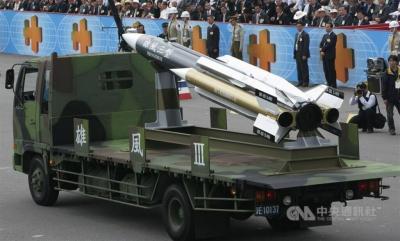Six out of 12 samples of imported or locally grown strawberries sold in Taiwan in January were found to contain excessive amounts of pesticide, the Consumers’ Foundation said yesterday.
The 12 samples — six from Taiwan, five from Japan and one from South Korea — were randomly selected from hypermarkets, supermarkets, fruit shops and traditional markets in Taipei, Taichung, Changhua County and Kaohsiung, foundation chairman Terry Huang (黃怡騰) told a news conference.
Among them, four samples — two imported from Japan and two locally grown — were found to contain excess amounts of pesticide residue, as well traces of pesticides not allowed for use on strawberries in Taiwan, Huang said.

Photo: CNA
Retailers caught selling strawberries with excess amounts of pesticide or banned pesticides face fines of NT$60,000 to NT$200 million (US$2.112 million to US$7.04 million), the foundation said, citing the Act Governing Food Safety and Sanitation (食品安全衛生管理法).
Serious breaches might result in mandatory business suspensions or closures, it added.
Each of the two locally grown substandard strawberry samples was found to contain one pesticide not authorized for use, foundation head inspector Ling Yung-chien (凌永健) said, adding that the contamination might have been caused by pollution from nearby areas or the growers mixing pesticides.
Another four locally grown strawberry samples passed the inspection, but seven to 17 different pesticides were found to have been used on them, he said.
Four out of five samples of Japanese strawberries failed the inspection — a failure rate of 80 percent, he said.
However on the Japanese sample that passed the inspection, fewer types of pesticide were used compared with the locally grown ones that passed the test, Ling added.
From January 2020 to last month, border inspections found 51 samples of imported strawberries to be substandard, he said, adding that 39 were from Japan, accounting for 76 percent of all substandard strawberries found at the border.

STATS: Taiwan’s average life expectancy of 80.77 years was lower than that of Japan, Singapore and South Korea, but higher than in China, Malaysia and Indonesia Taiwan’s average life expectancy last year increased to 80.77 years, but was still not back to its pre-COVID-19 pandemic peak of 81.32 years in 2020, the Ministry of the Interior said yesterday. The average life expectancy last year increased the 0.54 years from 2023, the ministry said in a statement. For men and women, the average life expectancy last year was 77.42 years and 84.30 years respectively, up 0.48 years and 0.56 years from the previous year. Taiwan’s average life expectancy peaked at 81.32 years in 2020, as the nation was relatively unaffected by the pandemic that year. The metric

Taiwan High Speed Rail Corp. (THSRC) plans to ease strained capacity during peak hours by introducing new fare rules restricting passengers traveling without reserved seats in 2026, company Chairman Shih Che (史哲) said Wednesday. THSRC needs to tackle its capacity issue because there have been several occasions where passengers holding tickets with reserved seats did not make it onto their train in stations packed with individuals traveling without a reserved seat, Shih told reporters in a joint interview in Taipei. Non-reserved seats allow travelers maximum flexibility, but it has led to issues relating to quality of service and safety concerns, especially during

A magnitude 5.1 earthquake struck Chiayi County at 4:37pm today, the Central Weather Administration (CWA) said. The hypocenter was 36.3km southeast of Chiayi County Hall at a depth of 10.4km, CWA data showed. There were no immediate reports of damage resulting from the quake. The intensity of the quake, which gauges the actual effect of a seismic event, measured 4 in Chiayi County, Tainan and Kaohsiung on Taiwan's seven-tier intensity scale, the data showed. The quake had an intensity of 3 in Chiayi City and Yunlin County, while it was measured as 2 in Pingtung, Taitung, Hualien, Changhua, Nantou and Penghu counties, the data

The Supreme Court today rejected an appeal filed by former Air Force officer Shih Chun-cheng (史濬程), convicted of Chinese Communist Party (CCP) espionage, finalizing his sentence at two years and two months for contravening the National Security Act (國家安全法). His other ruling, a ten-month sentence for an additional contravention, was meanwhile overturned and sent to the Taichung branch of the High Court for retrial, the Supreme Court said today. Prosecutors have been notified as Shih is considered a flight risk. Shih was recruited by Chinese Communist Party (CCP) intelligence officials after his retirement in 2008 and appointed as a supervisor